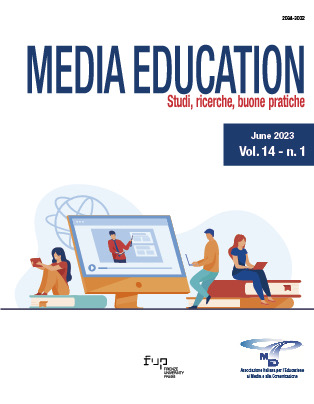Published 2023-05-31
Keywords
- adaptation,
- digital citizenship,
- Internet,
- reliability,
- survey
Copyright (c) 2023 Elif Gülbay, Ylenia Falzone, Rosario Emanuele Bonaventura

This work is licensed under a Creative Commons Attribution-NonCommercial-NoDerivatives 4.0 International License.
Abstract
Today digital media are configured as social environments that expand our personal, cultural, social and educational reality, therefore measuring citizens’ activities in online environments is of fundamental importance. In the last decade, different scholars have proposed different definitions of the digital citizenship and different measurement tools. Most definitions focus on two conceptions of digital citizenship, some more inherent in digital skills and others centered on critical aspects and civic engagement. In this study, we present the translation and Italian adaptation of two scales: the Digital Citizenship Scale by Al-Zahrani (2015) and the Digital Citizenship Scale by Choi, Glassman, and Cristol (2017). These two scales, consisting of a total of 72 items, were administered to 198 undergraduate students attending to the LM-85bis Master’s Degree Course at University of Palermo. We then proceeded with the reliability analysis by calculating the Alpha of Cronbach and the correlation between individual items and the total scale. The goal was to determine which profile, dimensions and digital citizenship needs characterize the participant university students. The results show that participants have good levels of digital citizenship in terms of respect and education for themselves and for others and in the self-assessment of technical skills in the digital field. Lower levels are recorded in participation and collaboration on cultural, social, political and economic issues.
References
Chen, L.L., Mirpuri, S., Rao, N., & Law, N. (2021). Conceptualization and measurement of digital citizenship across disciplines. Educational Research Review, 33, 100379. https://doi.org/10.1016/j.edurev.2021.100379
Choi, M. (2015). Development of a scale to measure digital citizenship among young adults for democratic citizenship education (Doctoral dissertation, The Ohio State University).
Choi, M., Glassman, M., & Cristol, D. (2017). What it means to be a citizen in the internet age: Development of a reliable and valid digital citizenship scale. Computers & education, 107, 100-112. https://doi.org/10.1016/j.compedu.2017.01.002
Conclusioni del Consiglio sull’istruzione digitale nelle società della conoscenza europee 2020/C 415/10, nota 7.
Connolly, R., & Miller, J. (2022). Evaluating and Revising the Digital Citizenship Scale. In Informatics (Vol. 9, No. 3, p. 61). MDPI. https://doi.org/10.3390/informatics9030061
Curran, M.B.F.X., & Ribble, M. (2017). P–20 Model of Digital Citizenship. New Directions for Student Leadership, 153, 35- 46. https://doi.org/10.1002/yd.20228
Domingo, S., & Guerrero, N. (2018). Extent of Students' Practices as Digital Citizens in the 21st century. Research in Social Sciences and Technology, 3(1), 134-148.
Emejulu, A., & McGregor, C. (2019). Towards a radical digital citizenship in digital education. Critical Studies in Education, 60(1) ,131–147. https://doi.org/10.1080/17508487.2016.1234494
European Commission (2007). Competenze informatiche (eSkills) per il XXI secolo: promozione della competitività, della crescita e dell’occupazione. in Internet all’URL: http://europa.eu.
Fernández-Prados, J.S., Lozano-Díaz, A., & Ainz-Galende, A. (2021). Measuring digital citizenship: A comparative analysis. In Informatics (Vol. 8, No. 1, p. 18). MDPI. https://doi.org/10.3390/informatics8010018
Frau-Meigs, D., O’Neill, B., Soriani, A., & Tomé, V. (2017). Digital Citizenship. Overview and new perspectives. Council of Europe: Strasbourg, France.
Gleason, B., & Von Gillern, S. (2018). Digital Citizenship with Social Media: Participatory Practices of Teaching and Learning in Secondary Education. Educational Technology & Society, 21 (1), 200–212.
Heath, M. K. (2018). What kind of (digital) citizen? A between-studies analysis of research and teaching for democracy. The International Journal of Information and Learning Technology, 35(5), 342-356. https://doi.org/10.1108/IJILT-06-2018-0067
Hui, B., & Campbell, R. (2018). Discrepancy between learning and practicing digital citizenship. Journal of Academic Ethics, 16(2), 117-131.
Isman, A., & Canan Gungoren, O. (2014). Digital citizenship. Turkish Online Journal of Educational Technology-TOJET, 13(1), 73-77.
Jwaifell, M. (2018). The Proper Use of Technologies as a Digital Citizenship Indicator: Undergraduate English Language Students at Al-Hussein Bin Talal University. World Journal of Education, 8(3), 86-94.
Kim, M., & Choi, D. (2018). Development of Youth Digital Citizenship Scale and Implication for Educational Setting. Educational Technology & Society, 21(1), 155–171.
Legge 20 agosto 2019, n. 92 Introduzione dell’insegnamento scolastico dell’educazione civica. (19G00105) (GazzettaUfficiale Serie Generale n.195 del 21-08-2019).
Lozano-Díaz, A., & Fernández-Prados, J.S. (2019). Towards an education for critical and active digital citizenship in the university. Revista Latinoamericana de Tecnología Educativa RELATEC, 18(1), 185-197.
Menichetti, L. (2017). La competenza digitale: dalla definizione a un framework per la scuola. MEDIA EDUCATION – Studi, ricerche, buone pratiche, 8(2), 175-195.
Mitchell, L. (2016). Beyond Digital Citizenship. Middle Grades Review, 1(3), 3.
Mossberger, K., Tolbert, C., & Mcneal, R. (2007). Digital citizenship: The internet, society, and participation. MIT Press.
Ribble, M., & Bailey, G. (2007). Digital Citizenship in Schools. ISTE: Washington, DC, USA.
Ribble, M., & Miller, T. N. (2013). Educational leadership in an online world: Connecting students to technology responsibly, safely, and ethically. Journal of asynchronous learning networks, 17(1), 137-145.
Tadlaoui-Brahmi, A., Çuko, K., & Alvarez, L. (2022). Digital citizenship in primary education. Social Sciences & Humanities Open, 6, 1-9.
Torrent-Sellens, J., & Martínez-Cerdá, J.F. (2017). Empoderamiento mediático mediante e-learning. Diseño y validación de una escala. El profesional de la información, 26(1), 43-54.
Vuorikari, R., Kluzer, S. and Punie, Y., (2022). DigComp 2.2: The Digital Competence Framework for Citizens - With new examples of knowledge, skills and attitudes. EUR 31006 EN, Luxembourg: Publications Office of the European Union. ISBN 978-92-76-48883-5, doi:10.2760/490274, JRC128415
Westheimer, J., & Kahne, J. (2004). What kind of citizen? The politics of educating for democracy. American educational research journal, 41(2), 237-269.

